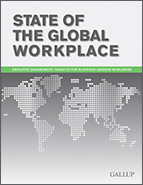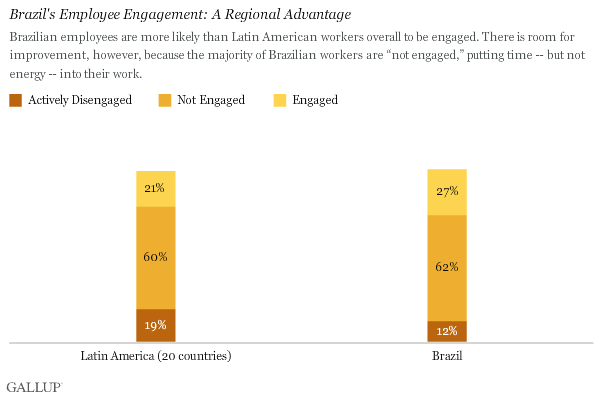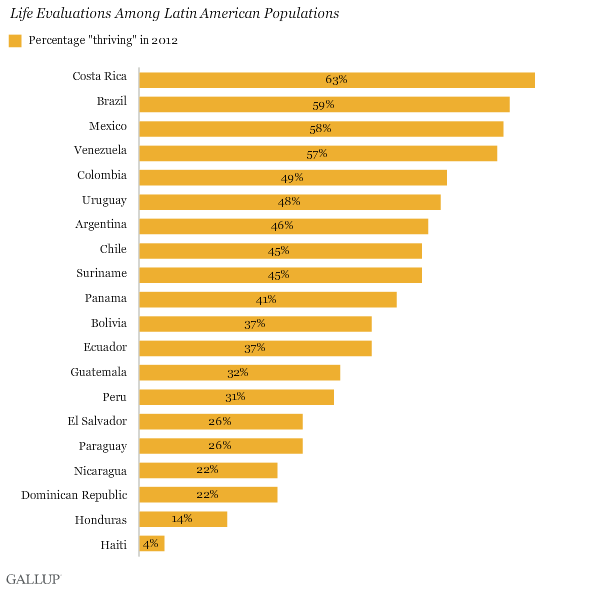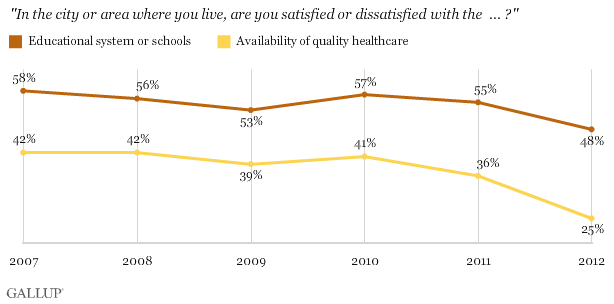Whether Brazilians' positive views are sustainable over the next decade remains to be seen.
Brazil's economy was, until recently, hailed as a "growth miracle" amid a lethargic global economy. In the past two years, however, Brazil's rapid growth -- like that of the world's other major emerging-market countries -- has slowed considerably, becoming a source of concern for economists and policymakers. To them, the end of the extended boom cycles in emerging-market countries signals a need for those countries to rebalance their economies. To achieve sustainable growth, emerging-market countries must come to rely less on commodity production and exports, which are subject to fluctuating demand among global markets, and more on internal sources of growth.
For many such countries, raising worker productivity is an important part of boosting internal growth. In Brazil, according to a 2012 Financial Times article, "Labor productivity … has grown by an average of barely more than 1% a year over the past 15 years, undermining its competitiveness."
Fixing that problem means investing in education and skills training, including entrepreneurial and financial literacy training. It also requires a shift in existing companies toward management strategies and workplace conditions that help maximize employees' productivity and their commitment to adding value to their organizations.
 Gallup's study of employee engagement in 142 countries, presented in the State of the Global Workplace report, contains relatively good news for Brazil. Among Brazilians who work for an employer, 27% are engaged, or highly productive and committed to providing value for their companies, while just 12% are actively disengaged and likely to be spreading negativity about their organization to their coworkers. There is plenty of room for improvement though. The bulk of Brazilian workers are "not engaged," lacking motivation and simply coasting through the workday. However, Brazil's ratio of engaged to actively disengaged workers -- 2.25:1 -- is one of the most favorable among 20 Latin American countries studied.
Gallup's study of employee engagement in 142 countries, presented in the State of the Global Workplace report, contains relatively good news for Brazil. Among Brazilians who work for an employer, 27% are engaged, or highly productive and committed to providing value for their companies, while just 12% are actively disengaged and likely to be spreading negativity about their organization to their coworkers. There is plenty of room for improvement though. The bulk of Brazilian workers are "not engaged," lacking motivation and simply coasting through the workday. However, Brazil's ratio of engaged to actively disengaged workers -- 2.25:1 -- is one of the most favorable among 20 Latin American countries studied.

Brazilian workers' relatively strong engagement results are accompanied by a broader sense of optimism among the general population. For most of the past decade, Brazil's economy saw remarkable growth. Tens of millions of Brazilians escaped poverty during that time as the country's middle class expanded. Gallup's analysis indicates that the proportion of Brazilians satisfied with their standard of living climbed from 66% in 2006 to 77% in 2010 before leveling off. Brazilians' overall life evaluations reflect their economic optimism. In 2012, 59% gave life ratings high enough to classify them as "thriving"; these are among the highest figures in the region.

A less certain future for Brazil's workforce
Whether Brazilians' positive views are sustainable over the next decade remains to be seen. Since Brazil's economic slowdown began in 2011, the country's unemployment rate has started to rise. More Brazilians are looking for jobs, and the quality of the jobs they can find will affect how they view their lives. Gallup's analysis reveals that among employed Brazilians, 48% of those who are actively disengaged at work are thriving in their overall lives, but 77% of those who are engaged are thriving. And unemployed Brazilians are more likely be thriving (54%) than those who are actively disengaged -- a pattern Gallup has seen before.
Falling growth rates have been accompanied by frustration among Brazilians who feel the government has failed to increase access to economic opportunities. In 2013, widespread protests erupted over various grievances, including lack of improvements to infrastructure and public services. Gallup's tracking polls suggest that the protests reflect broader public sentiment; Brazilians' satisfaction with education and healthcare services in the city or area where they live has declined significantly in recent years.

Protesters have pointed to the money spent on preparations to host the FIFA World Cup in 2014 and the 2016 Summer Olympics as examples of misspent resources. Yet the events are centerpieces of the Brazilian government's effort to promote the country as an international tourist destination. The contribution of Brazil's travel and tourism industry to the country's GDP grew by 7.8% in 2012, and the industry currently supports about 7.7 million jobs.
Some Brazilian leaders hope that dynamism in the labor-intensive tourism industry will lead to significant long-term job growth in Brazil's service sector. The country's relatively strong employee engagement results suggest that this strategy may work -- but it will rely largely on front-line employees' ability to satisfy customers, a key performance outcome of engaged workplaces. Among Brazilian workers in service-oriented jobs, 28% are engaged, while 13% are actively disengaged, nearly identical to the country's engagement results overall.
Helping employees remain confident in their future
Brazilian companies can reap real benefits from improving their engagement. For example, one Brazilian service company has embraced employee engagement as an important part of its business strategy while expanding geographically and moving to the leadership position in its market. The company has measured engagement every six months and has trained managers on how to create and implement action plans based on the results -- and its ratio of engaged to actively disengaged employees rose from 2.8:1 in 2009 to 11.8:1 in 2013. More importantly, the company's employee-focused management strategy has laid the groundwork for high productivity and service excellence.
Brazil will continue to grapple with economic challenges in the coming years. To overcome them, it is important for all businesses operating in Brazil -- from multinational corporations to small-business startups -- to focus on management practices that help employees stay engaged in their work and confident in their economic future.